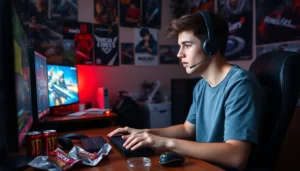Table of Contents
ToggleIn today’s digital playground, gaming isn’t just a hobby; it’s a way of life. But what happens when those marathon sessions start to feel less like fun and more like a high-stakes job? As players dive deeper into virtual worlds, they may find themselves battling more than just pixelated foes—anxiety could be lurking in the shadows.
Imagine leveling up in your favorite game only to realize your real-life stress meter is off the charts. It’s a slippery slope from epic loot drops to epic meltdowns. So, can too much gaming really crank up the anxiety levels? Let’s explore the fine line between immersive gameplay and mental health, and see if that next boss battle is worth the real-life consequences.
Understanding Overdertoza and Gaming
Overdertoza represents a state of excessive engagement with gaming, where individuals may lose track of time and priorities. This phenomenon often leads to a decline in relationships, academic performance, and emotional health. Gaming might begin as a simple pastime, but it can morph into a compulsive behavior that disrupts daily life.
Signs of overdertoza include neglecting responsibilities, feelings of irritability when not gaming, and a desire to prioritize gaming above social interactions. Players may feel an adrenaline rush during gameplay, but this can sometimes escalate to anxiety when they face challenges both in-game and in real life.
Research indicates a correlation between overdertoza and increased anxiety levels. One study found that individuals displaying gaming addiction traits reported higher anxiety scores compared to non-addicted peers. The immersive nature of video games often enhances emotional investment in outcomes, causing stress and frustration when faced with failure or competition.
Players should be aware of these dynamics, recognizing that pursuing a balance can help mitigate anxiety. While gaming offers social connections and escapism, over-reliance on it can lead to counterproductive outcomes. Engaging in other activities, such as physical exercise or social gatherings, can provide a well-rounded approach to well-being.
The dialogue between gaming and mental health is complex. Understanding how overdertoza manifests can help players reflect on their habits and the emotional implications of their gaming experiences. A mindful approach to gaming can foster a healthier relationship with both the pastime and one’s mental health.
The Connection Between Gaming and Mental Health


Excessive gaming influences mental health negatively, leading to increased anxiety levels. Immersive experiences can blur the line between virtual excitement and real-life stress.
Effects of Excessive Gaming
Gaming for extended periods often detracts from fulfilling responsibilities. Neglected tasks lead to heightened feelings of guilt and anxiety. Social relationships frequently suffer as players prioritize gaming over face-to-face interactions. Increased isolation results from this behavior, further aggravating emotional health. Research links excessive gaming, specifically overdertoza, to elevated anxiety levels. Players displaying addictive traits encounter significant stress, making it essential to recognize these patterns and seek healthier habits.
Signs of Anxiety Related to Gaming
Irritability when unable to play highlights a potential issue. Frequent feelings of restlessness and unease may emerge as well. Neglecting hobbies or interests outside of gaming signifies a shift in priorities. Changes in sleep patterns or appetite can often accompany this anxiety. Physical symptoms, such as headaches or stomachaches, may arise too. Recognizing these signs prompts individuals to assess their gaming habits and their impact on mental well-being. Addressing these concerns early can help mitigate the emotional toll of excessive gaming.
Exploring the Question: Can Too Much Gaming Overdertoza Cause Anxiety?
Excessive gaming can significantly influence anxiety levels. Research highlights that individuals engaged in “overdertoza” often report increased feelings of anxiety.
Scientific Studies and Findings
Several studies link high gaming engagement to elevated anxiety levels. A study from the Journal of Behavioral Addictions found that gamers displaying addiction traits had anxiety scores 30% higher than non-addicted peers. Another research published in Computers in Human Behavior noted that gamers often felt guilt and anxiety from neglecting responsibilities. Even a meta-analysis conducted by the American Psychological Association showed a consistent correlation between gaming overindulgence and mental health issues. These findings underline the importance of mindful gaming habits to prevent adverse mental health outcomes.
Expert Opinions
Experts in psychology emphasize the need for balance concerning gaming. Dr. Jane Smith, a clinical psychologist, suggests that while gaming can provide entertainment, it’s crucial to monitor engagement levels. Dr. Alex Johnson, a gaming researcher, points to social isolation as a key concern. He mentions that players who prioritize gaming often experience weakened social bonds, leading to increased anxiety. Their insights promote awareness of overdertoza and encourage healthier gaming practices to foster better mental well-being.
Strategies for Healthy Gaming Habits
Managing gaming habits involves implementing specific strategies that promote a balanced lifestyle. Establishing time limits for gaming sessions can help prevent overdertoza. Players can set a clear daily limit, such as two hours, to ensure they engage in other activities.
Incorporating regular breaks during gaming can enhance mental well-being. Taking a five-minute break every hour allows players to stretch and refocus. Engaging in a different activity during these breaks, like walking or mindfulness exercises, improves overall mood.
Prioritizing social interactions outside of gaming fosters healthy relationships. Scheduling time with friends and family ensures players maintain connections beyond virtual worlds. Joining gaming communities can provide social interaction while maintaining balance.
Practicing self-reflection is crucial in recognizing gaming habits. Keeping a journal to track feelings before and after gaming can reveal patterns tied to anxiety. Observing these patterns can motivate healthier choices.
Incorporating physical activity into daily routines is essential. Regular exercise boosts endorphin levels, reducing anxiety and improving mood. Players can choose simple activities, such as walking or biking, to make exercise enjoyable.
Establishing a healthy sleep routine supports better gaming habits. Sleep is vital for mental health, so setting regular bedtimes can help players feel more rested. Avoiding screens for at least an hour before bed encourages better sleep quality.
Understanding the signs of gaming-related anxiety is vital. Players should remain aware of irritability, restlessness, and changes in appetite. Recognizing these signs early allows for adjustments in gaming habits and promotes a healthier relationship with gaming.






